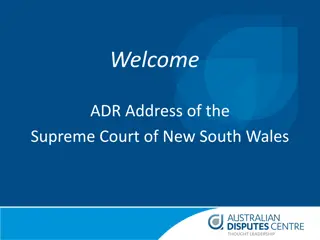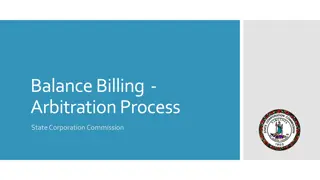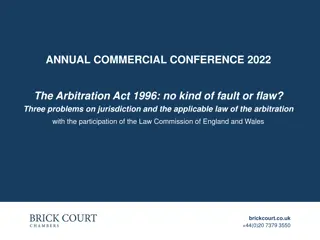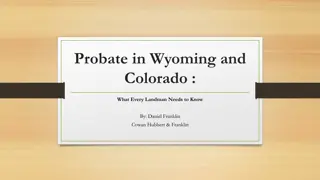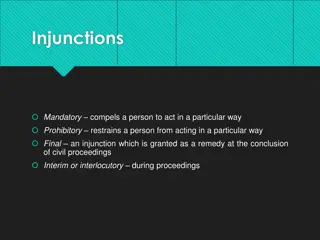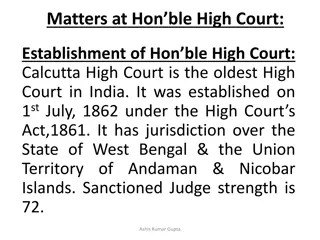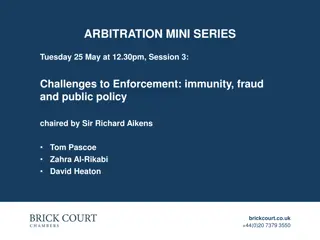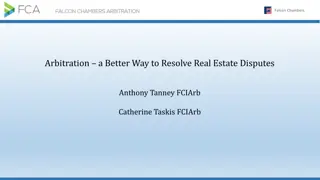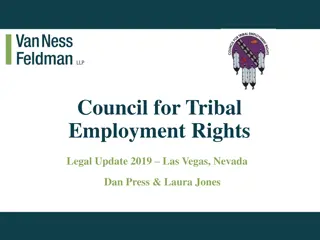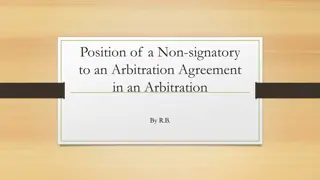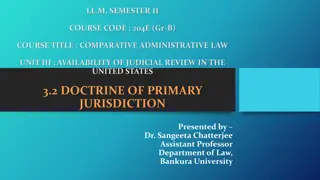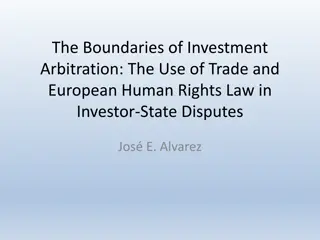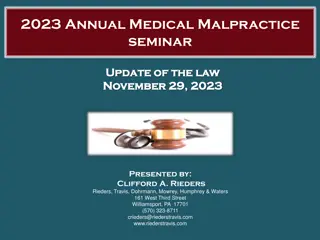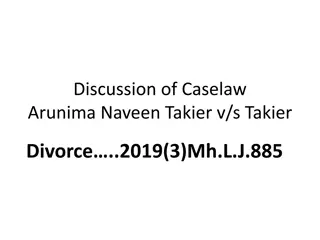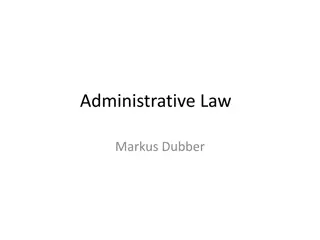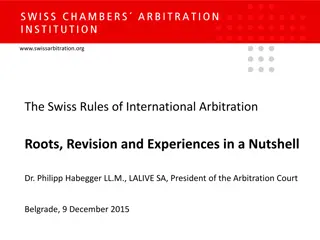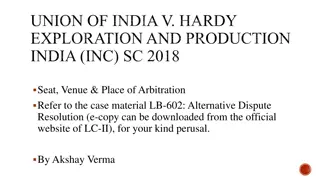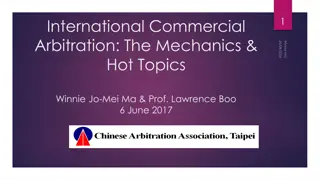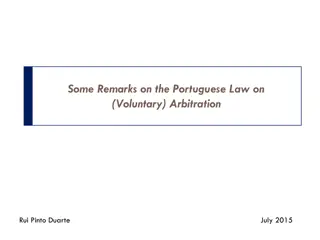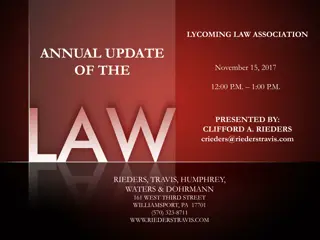Understanding Jurisdiction Challenges and Stay Proceedings in Arbitration
Delve into the intricate world of arbitration, focusing on jurisdiction challenges, stays under Section 9 of the Arbitration Act 1996, key principles, decision-making processes of the court, and the two-stage inquiry method. Learn about mandatory stays, burden of proof, Kompetenz-kompetenz vs. English court's duty, and the nuances of determining matters within the scope of an arbitration clause. Gain insights into applicable cases and principles governing arbitration proceedings.
Download Presentation

Please find below an Image/Link to download the presentation.
The content on the website is provided AS IS for your information and personal use only. It may not be sold, licensed, or shared on other websites without obtaining consent from the author. Download presentation by click this link. If you encounter any issues during the download, it is possible that the publisher has removed the file from their server.
E N D
Presentation Transcript
ARBITRATION MINI SERIES Friday 30 April at 12.30pm, Session 1: Jurisdiction: Section 9 challenges and the Tribunal s jurisdiction over third parties chaired by Fionn Pilbrow QC Jasbir Dhillon QC Fred Hobson Ben Woolgar brickcourt.co.uk +44(0)20 7379 3550
Stays under s.9 Arbitration Act 1996 Ben Woolgar brickcourt.co.uk +44(0)20 7379 3550
s.9 itself "(1) A party to an arbitration agreement against whom legal proceedings are brought (whether by way of claim or counterclaim) in respect of a matter which under the agreement is to be referred to arbitration may (upon notice to the other parties to the proceedings) apply to the court in which the proceedings have been brought to stay the proceedings so far as they concern that matter . (4) On an application under this section the court shall grant a stay unless satisfied that the arbitration agreement is null and void, inoperative, or incapable of being performed." brickcourt.co.uk +44(0)20 7379 3550
Key principles 1. Based on Article II of the New York Convention 2. The stay is mandatory, not discretionary 3. The agreement is one not only to arbitrate, not also not to litigate : Bridgehouse (Bradford No 2) Ltd v BAE Systems PLC [2020] EWCA Civ 759 4. Burden under s.9(1) is on applicant, but burden on s.9(4) is on respondent 5. Standard of proof: 1. Under s.9(1), balance of probabilities/final decision 2. Under s.9(4), context-sensitive : see JSC Aeroflot Airlines v Berezovsky [2013] EWCA Civ 784 brickcourt.co.uk +44(0)20 7379 3550
How the Court decides Kompetenz-kompetenz vs. English court s duty The three (?) options (Al-Naimi v Islamic Press Agency Inc [2000] 1 Lloyd s Rep 522) Decide the issue in a summary fashion Order a trial of the issue under CPR r.62.8(3) Stay under its inherent jurisdiction Try a preliminary issue Stay under the inherent jurisdiction = a high threshold : see Republic of Mozambique v Privinvest [2020] EWHC 1709 (Comm) Timings, evidence, nature of inquiry brickcourt.co.uk +44(0)20 7379 3550
The two-stage inquiry : Republic of Mozambique Two-stage enquiry First, decide what matters are raised by the proceedings CA endorsed Sodzawiczny v Ruhan [2018] 2 Lloyds Rep 280. Any dispute or difference not limited to a pleaded cause of action Includes foreseeable defences Desire to avoid fragmentation not a permissible consideration Second, decide whether they are within the scope of the clause Matter of construction Two areas shade into one another brickcourt.co.uk +44(0)20 7379 3550
The jurisdiction of the Tribunal over third parties: English law vs New York/California law Jasbir Dhillon QC and Fred Hobson brickcourt.co.uk +44(0)20 7379 3550
The problem brickcourt.co.uk +44(0)20 7379 3550
English law: (very likely) No Can you treat the controller/parent as party to the arbitration agreement? Basic answer: No (except for novation/assignment). Route (1): Agency / undisclosed principal. Route (2): Piercing the corporate veil. brickcourt.co.uk +44(0)20 7379 3550
English law piercing the corporate veil (1) Prest v Petrodel [2013] 2 AC 415 1. Controller is under an existing obligation. 2. Company is interposed to evade that obligation. 3. Disregard the company s separate personality on the evasion principle. To note: 1. Exceptional. 2. Aimed at giving you a remedy against the company, not the controller. brickcourt.co.uk +44(0)20 7379 3550
English law piercing the corporate veil (2) VTB v Nutritek [2013] 1 All ER 1296 Two problems: 1. Not a situation where the controller is evading an existing liability. Not an abuse to cause a liability to be incurred by the company in the first place. 2. Doctrine cannot be used to hold the controller liable as if he is a contracting party, when he is not party to the contract. brickcourt.co.uk +44(0)20 7379 3550
Discussion points 1. Choice of law (a) New York company. Arguably, apply the law of the place of incorporation: see VTB at para 131. (b) Akhmedova v Akhmedov [2018] EWFC 23 (Fam) at para 61: lex fori. (c) Tribunal not bound by domestic choice of law rules. 2. Party autonomy parties choice not to make the controller a party to the contract. 3. Legal certainty v discretion to achieve justice in the particular case. brickcourt.co.uk +44(0)20 7379 3550
ARBITRATION MINI SERIES Friday 30 April at 12.30pm, Session 1: Jurisdiction: Section 9 challenges and the Tribunal s jurisdiction over third parties chaired by Fionn Pilbrow QC Jasbir Dhillon QC Fred Hobson Ben Woolgar brickcourt.co.uk +44(0)20 7379 3550



